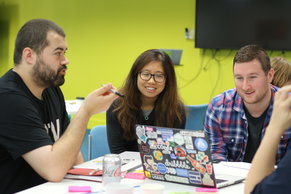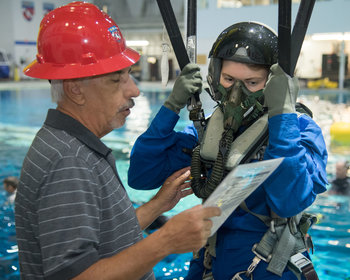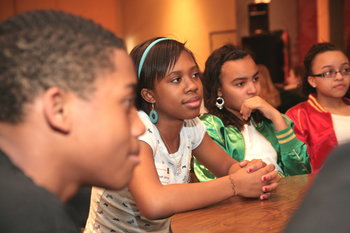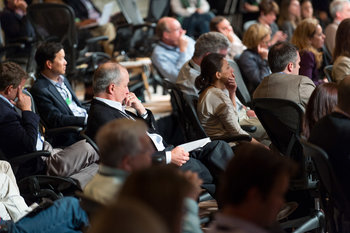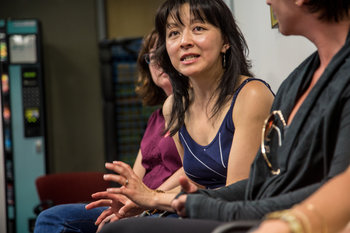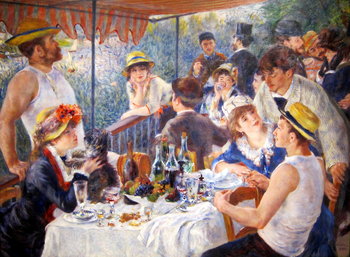
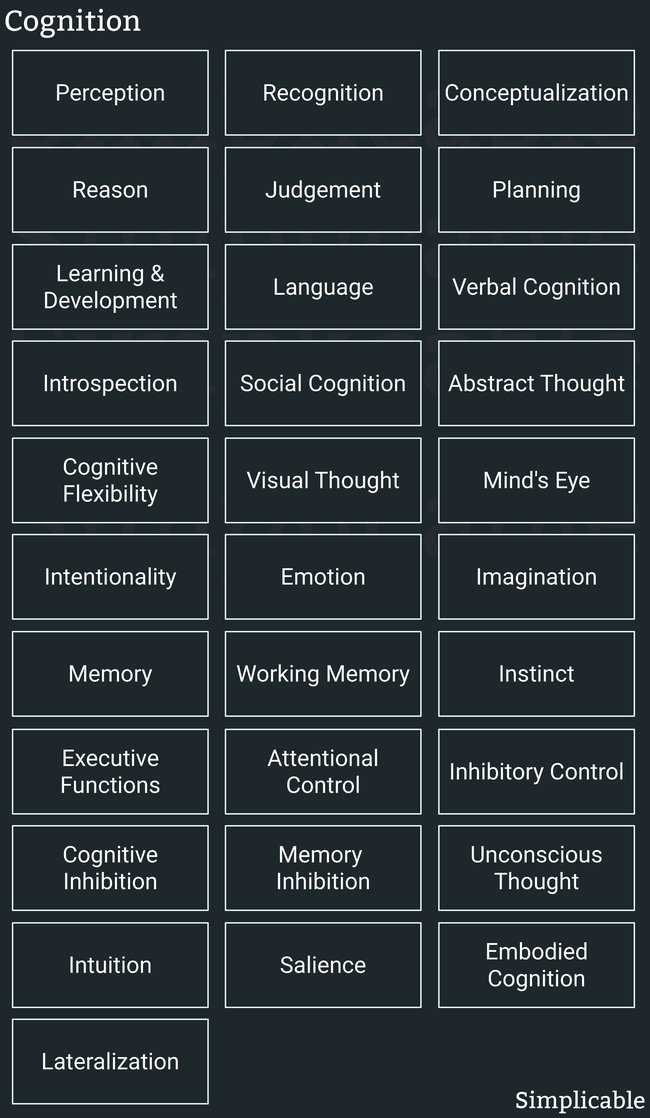
Perception
Perception is cognition related to sensory processing including the interpretation of the senses. This includes the basic senses of vision, sound, touch, taste and smell. Humans can also perceive other things such as a sense of self, time and sensations.Recognition
The process of matching things to memory. This can include recognition of entities in sensory information and recognition of concepts, patterns and other intangible things.Conceptualization
The formation of ideas and concepts.Reason
The ability to use the tools of rational thought such as inference.Judgement
A type of reasoning that involves evaluating if ideas are true, false or some grey area in-between.Planning
A type of reasoning that involves setting out a series of actions that may bring forth a desired outcome. Strategy, problem solving and decision making are types of planning.Learning & Development
The ability to learn information, acquire language, develop abilities and improve.Language
The ability to understand, compose and communicate complex thoughts using the elements of language such as words, syntax and grammar.Verbal Cognition
Thinking using language. This involves an internal monologue that is a primary type of conscious thought for many people.Introspection
Self-awareness and self-reflection whereby an individual can examine their own thoughts, emotions, memories and personality. For example, a person who can identify their own failures of rational thought such as biases or motivated reasoning.Social Cognition
The brain appears to be adapted to social processes such as recognizing emotion in faces, voices and body language.Abstract Thought
Abstract thought is the ability to think in high level concepts that don't directly correspond to physical reality. For example, the ability to understand and use a concept such as "freedom."Cognitive Flexibility
The capacity to think about multiple things at the same time and switch between tasks without losing track of context. For example, a pilot who is able to land an aircraft while communicating to a copilot and thinking about their weekend.Visual Thought
The ability to understand visual information including visual abstractions such as symbols and diagrams. This can include the ability to think and solve problems with pictures.Mind's Eye
The process of seeing visual images with the mind including approximations from memory and imaginary scenes.Intentionality
A sense of purpose and motivation that drives people towards behavior and goals.Emotion
States of mind that color all cognition for a period of time. For example, fear that causes a high state of alertness.Imagination
Imagination is the ability to think about things that differ from reality.Memory
The ability to remember and recall certain information over the long term.Working Memory
Short term memory that is used for current thinking processes. For example, remembering the context and content of an article as you read through it.Instinct
An instinct is a complex behavior that is innate such that it is a shared cognitive tendency of humans. For example, the theory that humans have a herd instinct that is the foundation for a wide range of complex behaviors such as fear of missing out.Executive Functions
Executive function is a term for thought processes that control behavior. This includes high level functions such as reasoning and inhibitory control. It also includes low level functions that can be controlled by an individual such as working memory. For example, using working memory to plan a path to get to a destination on a bicycle.Attentional Control
The ability to concentrate on something. For example, following a single line of reasoning for an extended period of time to solve a problem.Inhibitory Control
Inhibitory control is the ability to suppress instinctual, habitual, emotional or motivated reactions. This can be done to select a reasoned response over an impulsive response to a situation. For example, the ability to resist doing something socially unacceptable due to surging emotions such as anger.Cognitive Inhibition
Strategically ignoring information. This can include the ability to suppress perceptions, thoughts and memories that aren't useful to a task. For example, temporarily discarding your own opinions to consider the perspective of another person.Memory Inhibition
The capacity to suppress and forget unproductive memory. For example, it is useful to remember where you parked your bicycle but not to remember every location you have ever parked a bicycle in your life.Unconscious Thought
The brain performs a large number of functions autonomously without the direction of conscious thought. For example, if you think about a problem consciously and then go on to something else, unconscious thought processes appear to be able to continue working on the problem. This theory is used to explain why a solution to a problem suddenly comes after taking a break.Intuition
Intuition is the ability to perceive knowledge that doesn't originate with the conscious mind. This may be a process of unconscious thought. However, as with most theories of cognition, intuition isn't well understood.Salience
Salience is an unconscious thought process that causes you to notice things that might be important in a fast moving stream of sensory information. For example, noticing a bug that is running across your floor due to its movement.Embodied Cognition
The theory that the body plays a significant role in cognition such that thinking isn't confined to the brain. For example, the gastrointestinal tract, or gut, has around 100 million nerve cells known as the enteric nervous system that appears to function as a "second brain." This is very small compared to the eighty six billion neurons of the brain. There are a large number of interactions between the stomach and brain known as brain-gut connection. People can consciously feel the role that the stomach plays in cognition as indicated by expressions such as "gut feeling."Lateralization
The brain is divided into two hemispheres – left and right that appear to have specialized functions. This is far more complex and flexible than is presented by pseudo-science such as popular psychology. For example, language processing appears to be handled by the left side in most people but is handled by the right or both sides in some people.Notes
Cognition is not well understood. Complicating matters it is studied from many different points of view. Theories of cognition originate from fields such as medicine, biology, neuroscience, logic, philosophy, linguistics, social science, psychiatry, psychology, education, anthropology and computer science.| Overview: Cognition | ||
Type | ||
Definition | The process of thinking. | |
Related Concepts | ||












